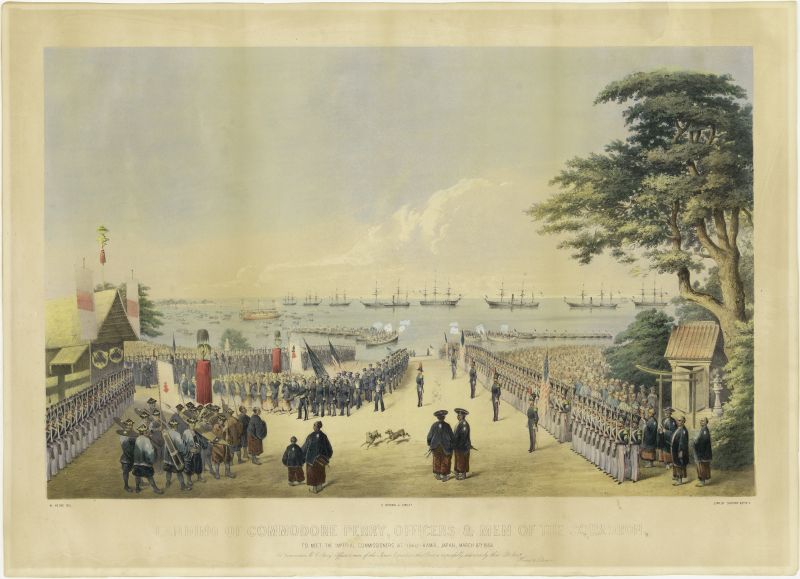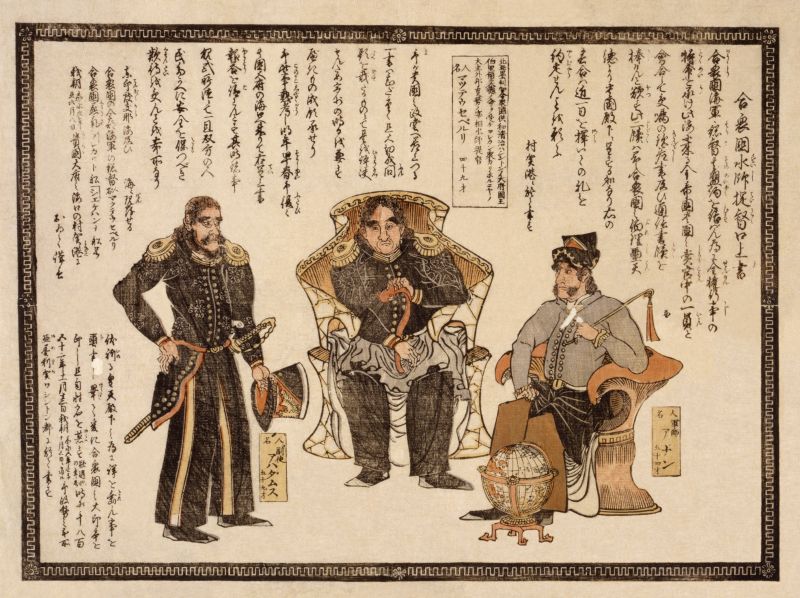
Landing of Commodore Perry at Yokohama, Japan, March 8th 1854
The Japanese Government’s Reaction to Commodore Perry’s Arrival
The arrival of Commodore Matthew Perry of the United States Navy in July 1853 marked a significant turning point in Japanese history. Leading a squadron of two steamers and two sailing vessels, Perry sailed into Tokyo harbor aboard the frigate Susquehanna, demanding that the Japanese government open its ports for trade with the United States. This event sparked a series of reactions from both the Japanese government and the wider population, ultimately leading to the downfall of the Tokugawa Shogunate and the establishment of a new centralized government. In this article, we will explore the various reactions of the Japanese government and people to Commodore Perry’s arrival.
Background: Tokugawa Japan
To understand the reactions of the Japanese government to Perry’s arrival, it is essential to first examine the political landscape of Japan at the time. In the early 17th century, Japan was ruled by the Tokugawa Shogunate, a military government led by the powerful Tokugawa family. The Shogunate had maintained a policy of isolation from the rest of the world for over two centuries, believing that foreign influences such as trade, Christianity, and firearms could potentially destabilize the delicate balance of power between the Shogun and the feudal lords.
The Tokugawa Shogunate’s Isolationist Policy
The isolationist policy of the Tokugawa Shogunate was established by the third Shogun, Tokugawa Iemitsu, in the 17th century. This policy had several key components, including strict regulations on foreign trade, the prohibition of Christianity, and the restriction of firearms. The Shogunate believed that these measures would protect the stability of their rule by limiting the influence of foreign powers and preventing the rise of a powerful, unified opposition.
Tokugawa Japan’s Political Structure
The Tokugawa Shogunate was not a centralized state, but rather a collection of semi-autonomous domains ruled by feudal lords, who were relatives or allies of the Tokugawa family. The Shogun maintained control over these domains by forbidding marriages among the feudal lords’ families and by requiring them to spend every other year in Edo (now Tokyo), the Shogunal capital. This system effectively prevented any alliances from forming against the Shogunate and ensured its dominance over Japan.
The Arrival of Commodore Perry
The arrival of Commodore Perry and his fleet in 1853 marked the end of Japan’s isolationist policy and forced the Japanese government to confront the reality of a rapidly changing world. Perry’s demands for open trade and the establishment of diplomatic relations between the United States and Japan threatened the very foundations of the Tokugawa Shogunate.
The Immediate Reaction of the Japanese Government
Upon witnessing the arrival of Perry’s fleet, the Japanese government was initially resistant to his demands. Many officials viewed the foreign ships as a threat to Japan’s sovereignty and wanted the foreigners expelled from the country. However, it quickly became apparent that the Japanese military was no match for the advanced naval technology of the American fleet. With no viable means of defense, the Japanese government was left with little choice but to acquiesce to Perry’s demands.
Treaty Negotiations and the Opening of Japanese Ports
In 1854, the Japanese government signed the Treaty of Kanagawa, which allowed for trade between the United States and Japan at two ports, Shimoda and Hakodate. This marked the beginning of a series of treaties with Western powers, including Russia, Britain, France, and the Netherlands, which forced Japan to open additional ports and establish diplomatic relations with these countries. These agreements, known as the “unequal treaties,” were seen as an affront to Japan’s sovereignty and a clear sign of the Tokugawa Shogunate’s weakness in the face of foreign pressure.
The Impact of Commodore Perry’s Arrival on the Japanese Economy
The opening of Japan’s ports to foreign trade had a profound impact on the country’s economy. The influx of foreign currency disrupted the Japanese monetary system, leading to inflation and economic instability. The Japanese government struggled to adapt to these changes, further highlighting the inadequacies of the Tokugawa Shogunate.
Economic Disruption and Instability
The influx of foreign currency and goods into Japan had far-reaching effects on the economy. The rapid increase in the supply of foreign currency led to inflation, as the value of Japanese currency declined relative to foreign currencies. This inflation had a destabilizing effect on Japan’s economy, as the cost of living increased and traditional industries struggled to compete with foreign imports.
The Japanese Government’s Struggle to Adapt
The Tokugawa Shogunate was ill-equipped to handle the economic changes brought about by the opening of Japan’s ports to foreign trade. The government’s lack of experience with international trade and diplomacy, coupled with its rigid adherence to outdated policies, made it difficult for the Shogunate to adapt to the new economic realities and address the growing discontent among the population.
The Downfall of the Tokugawa Shogunate
The arrival of Commodore Perry and the subsequent opening of Japan’s ports to foreign trade exposed the weaknesses of the Tokugawa Shogunate and ultimately led to its downfall. The inability of the Japanese government to effectively manage the country’s economic and diplomatic affairs in the face of foreign pressure led to a loss of confidence in the Shogunate’s ability to rule.
Calls for a Change in Leadership
As the problems associated with foreign trade continued to mount, some samurai leaders began to call for a change in leadership. They argued that the Tokugawa Shogunate was incapable of dealing with the challenges posed by the Western powers and that a new, centralized government was needed to restore Japan’s sovereignty and address the nation’s economic woes.
The Rise of the Emperor and the End of the Shogunate
The growing dissatisfaction with the Tokugawa Shogunate eventually led to a movement to restore the Emperor to a position of political power. In 1868, the Meiji Restoration marked the end of the Tokugawa Shogunate and the establishment of a new centralized government under the Emperor. This change in leadership represented a significant break from the past and set the stage for Japan’s rapid modernization in the decades that followed.
The Reaction of the Japanese People to Commodore Perry’s Arrival
The arrival of Commodore Perry and the opening of Japan to foreign trade had a profound impact on the Japanese people. While some embraced the new opportunities presented by increased interaction with foreign powers, others were deeply suspicious of the changes and sought to protect Japan’s traditional way of life.
The Emergence of a Pro-Modernization Faction
For some in Japan, the arrival of Commodore Perry represented an opportunity to learn from the West and modernize Japan’s economy, military, and political system. This pro-modernization faction, which included many samurai and merchants, saw the rapid changes taking place in the world and believed that Japan needed to adapt in order to survive and thrive in the new global order.
Resistance to Foreign Influence and a Push for Nationalism
On the other hand, there were those who viewed the arrival of foreign ships and the opening of Japan’s ports as an affront to Japan’s sovereignty and a threat to its traditional way of life. This anti-foreign faction sought to expel the foreigners from Japan and restore the country’s isolationist policies. This resistance to foreign influence eventually evolved into a broader nationalist movement, which played a significant role in the eventual downfall of the Tokugawa Shogunate.
Conclusion
The arrival of Commodore Perry and his demands for open trade with Japan had far-reaching consequences for the Japanese government and the country as a whole. Faced with the reality of a rapidly changing world, the Tokugawa Shogunate’s inability to adapt to new economic and diplomatic challenges ultimately led to its downfall. The reactions of the Japanese government and people to Perry’s arrival were complex and varied, reflecting the diverse political, economic, and cultural forces at play in Japan during this tumultuous period.

A Japanese woodblock print of Perry (center) and other high-ranking American seamen